Charles E W Bean, Diaries, AWM38 3DRL 606/117/1 - September - December 1918 - Part 6
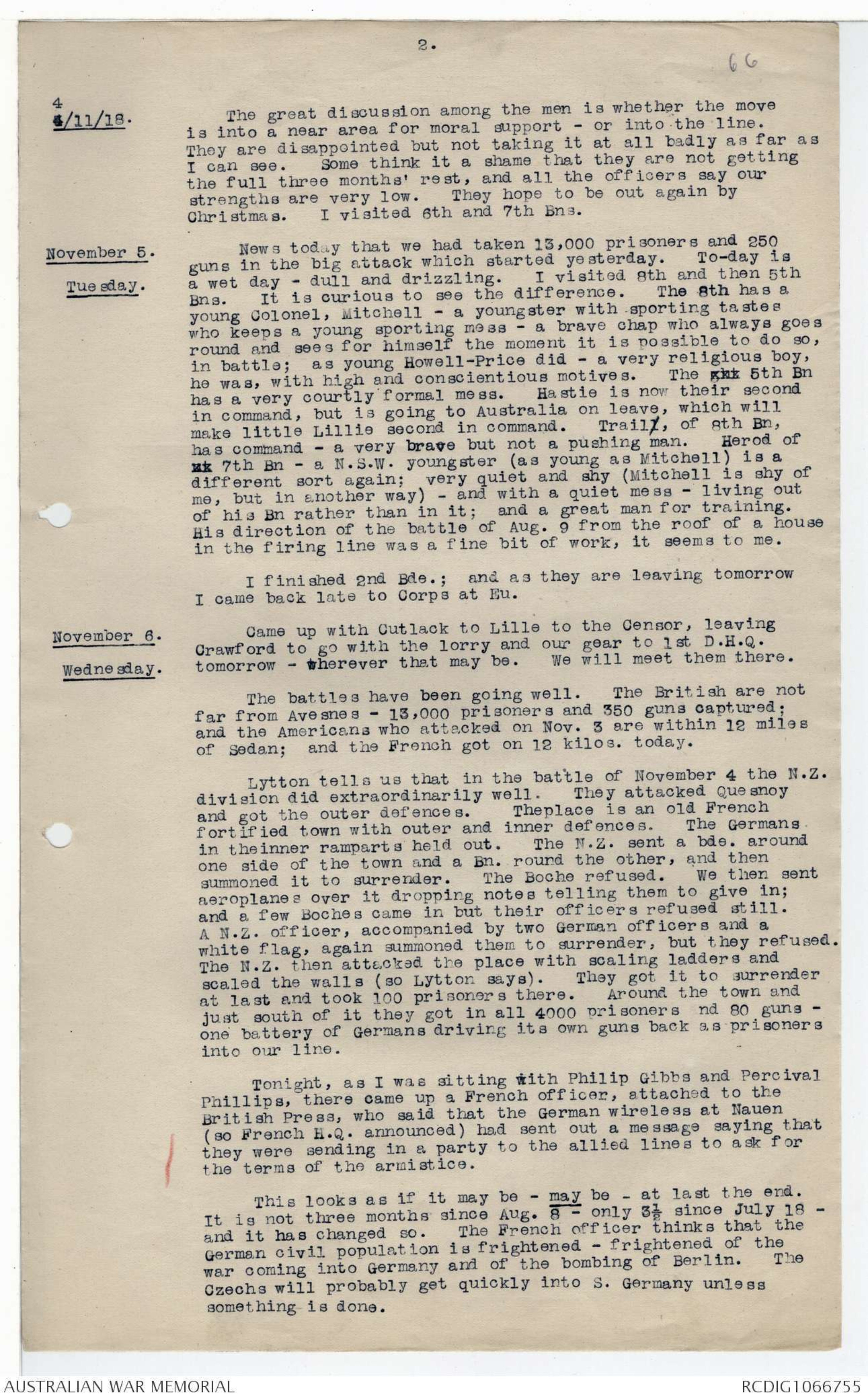
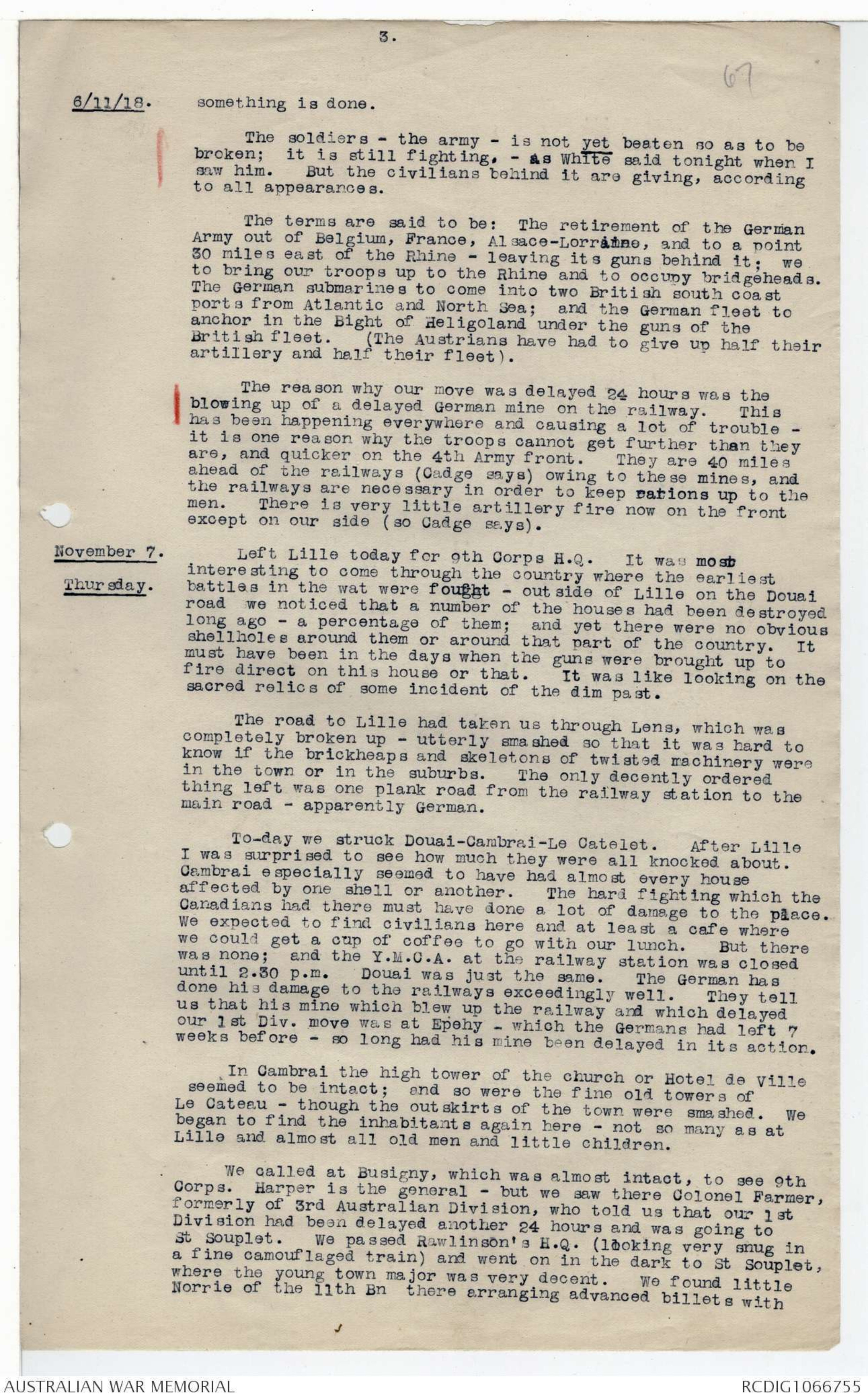
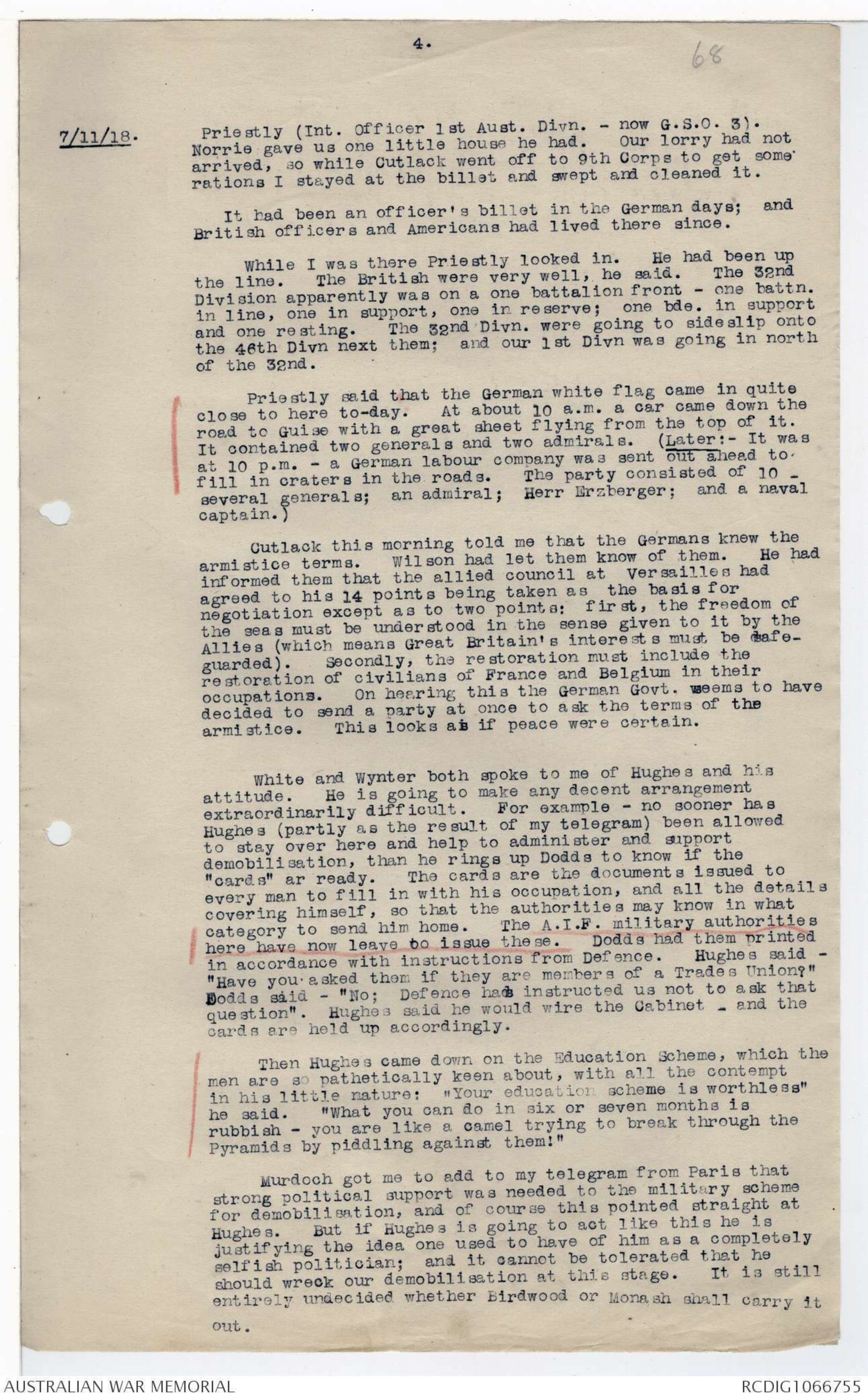
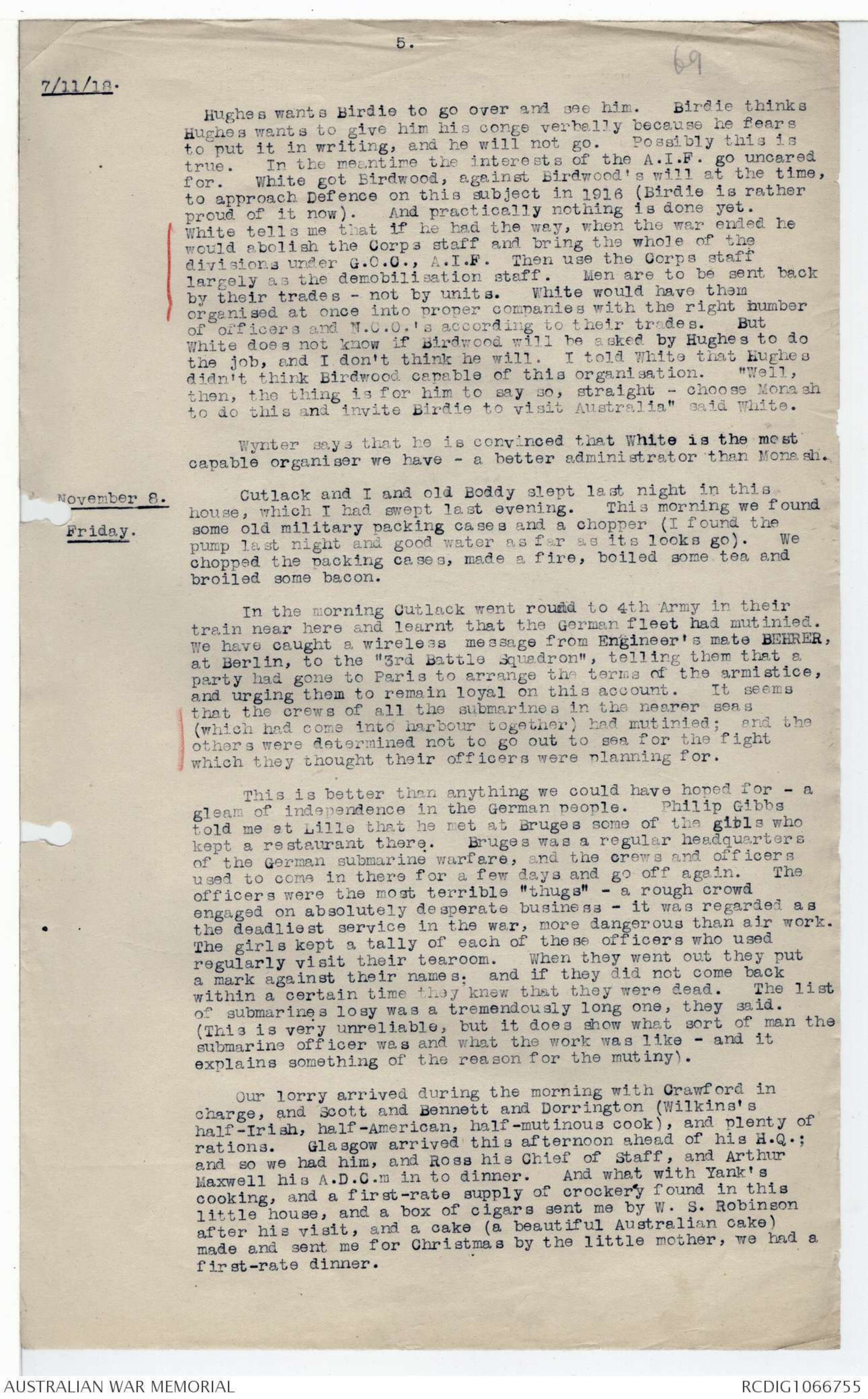
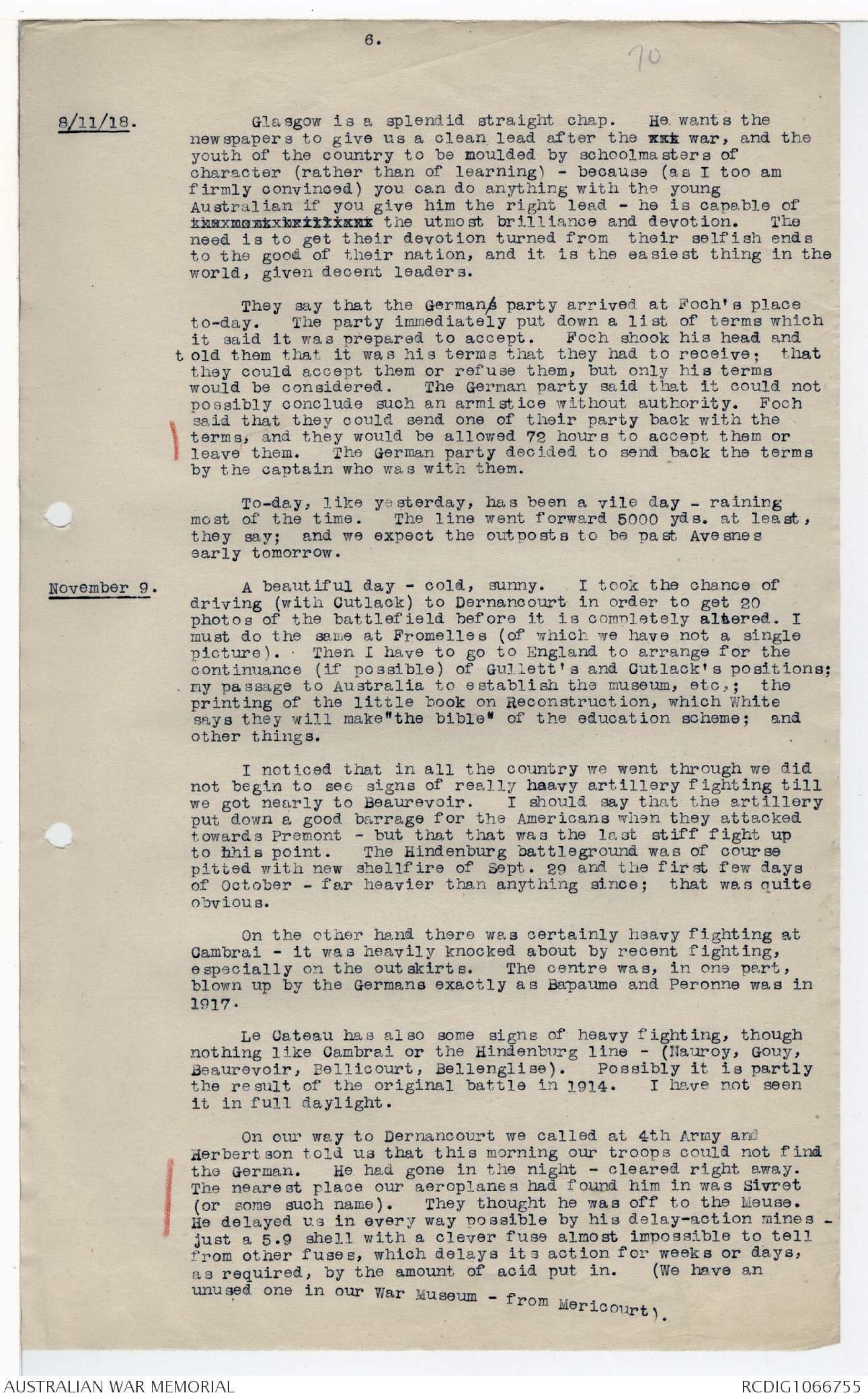
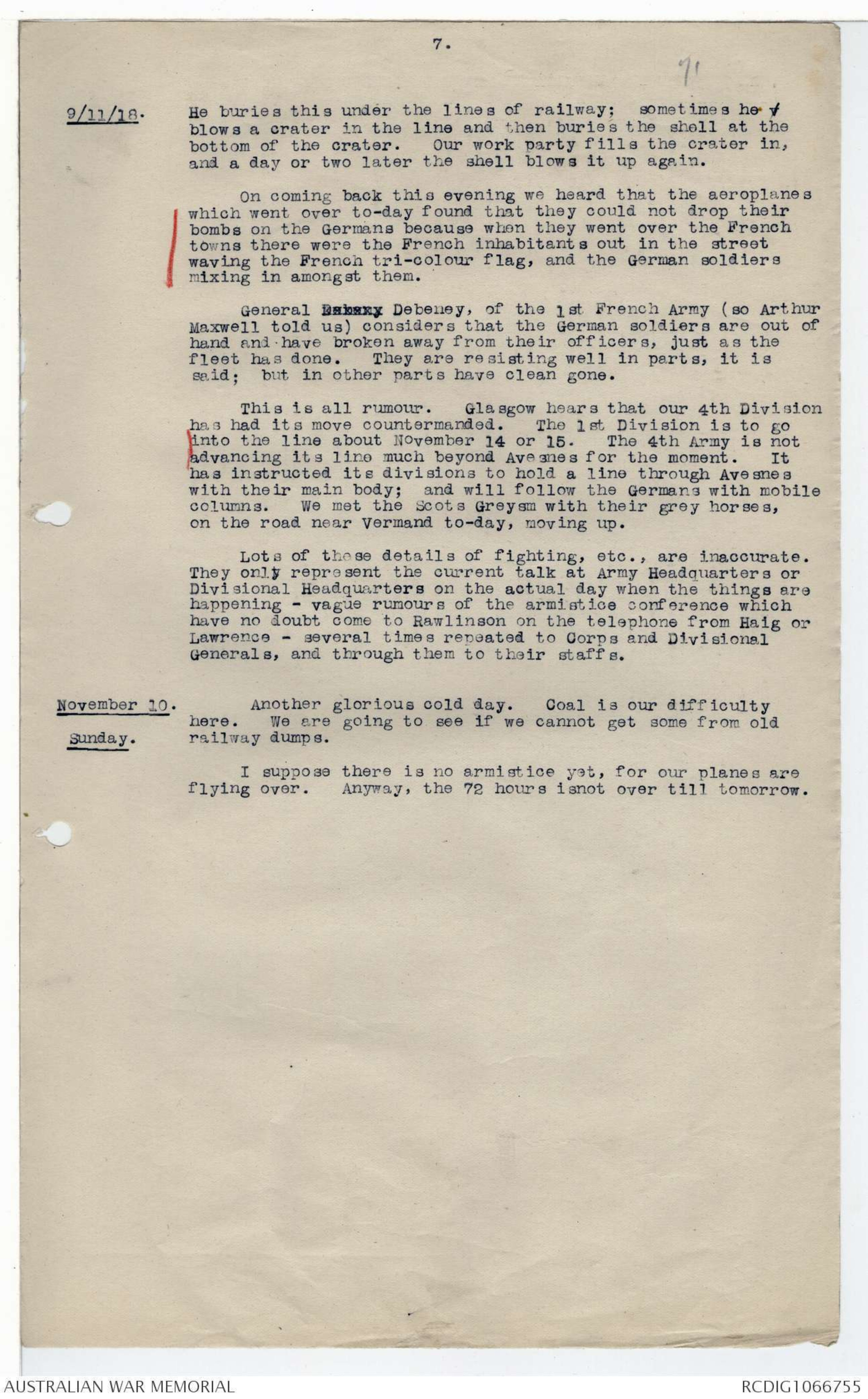
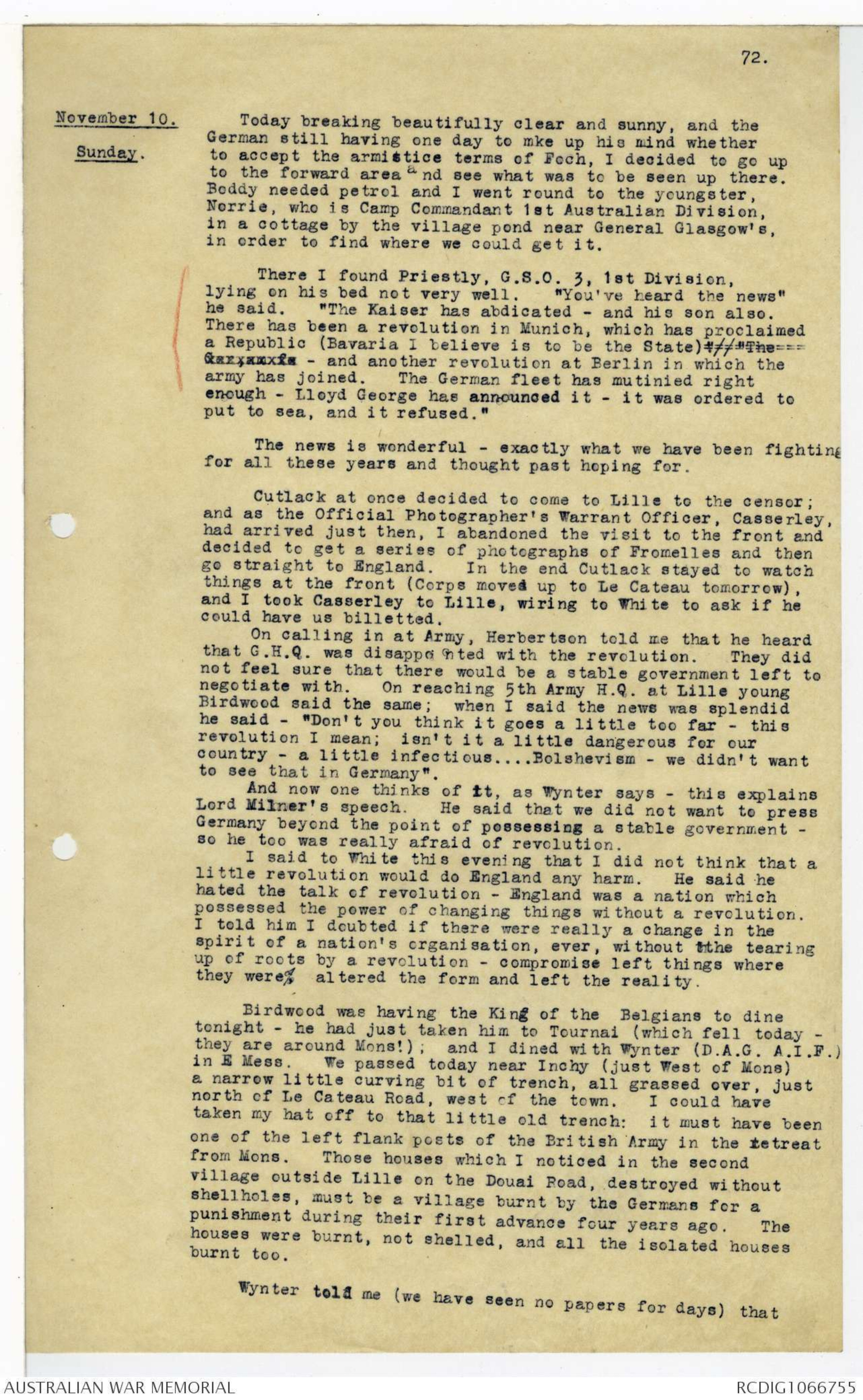
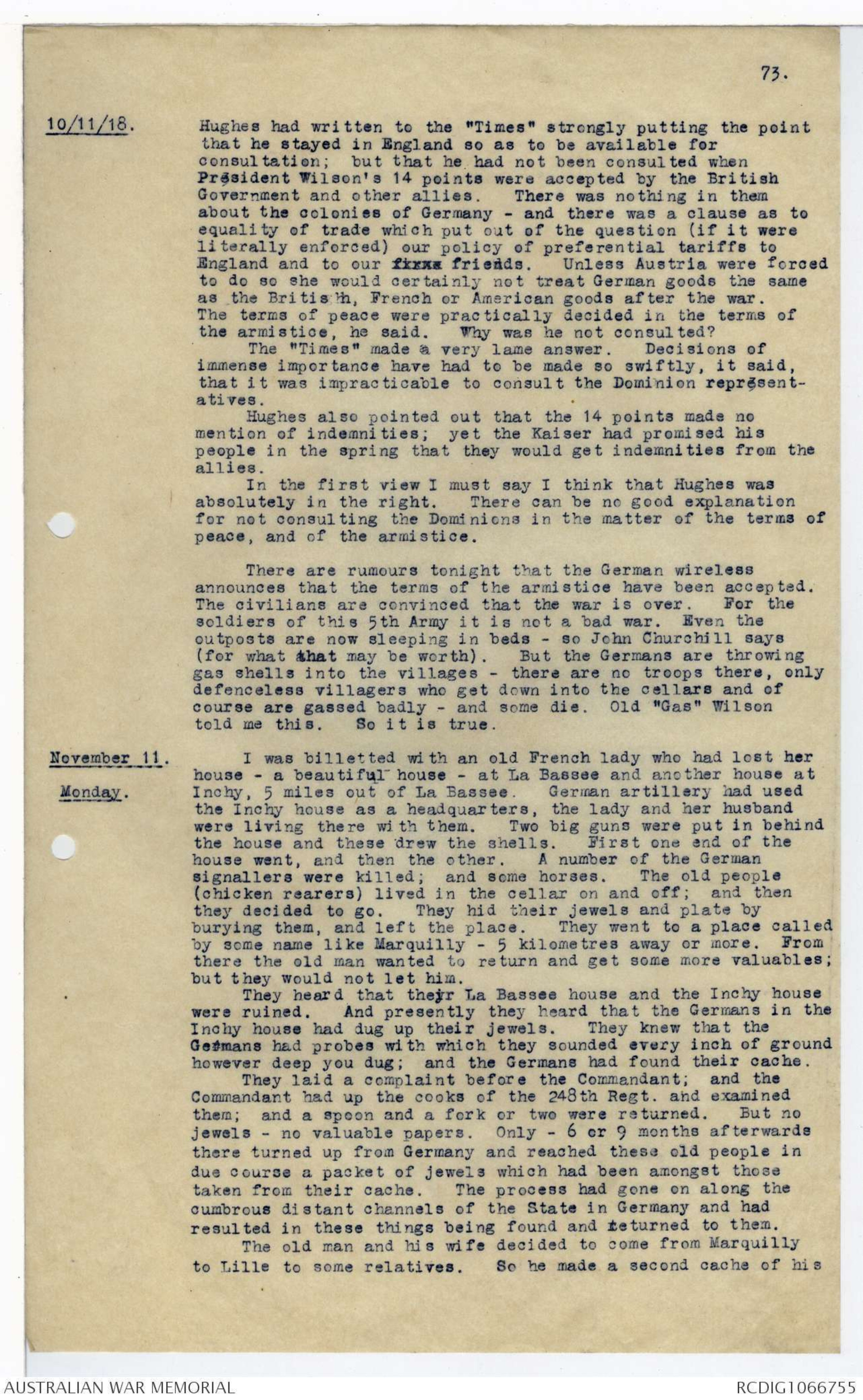
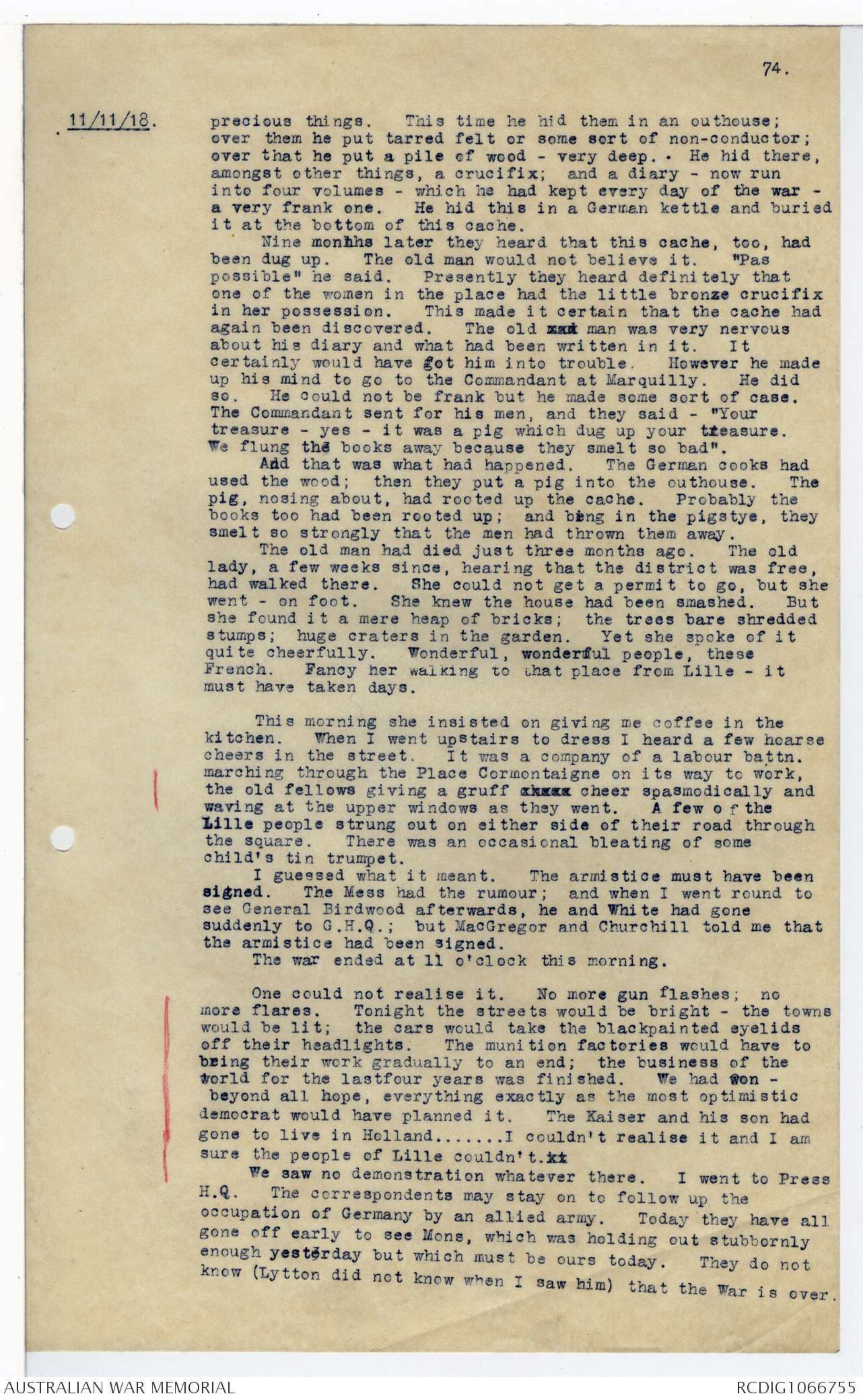
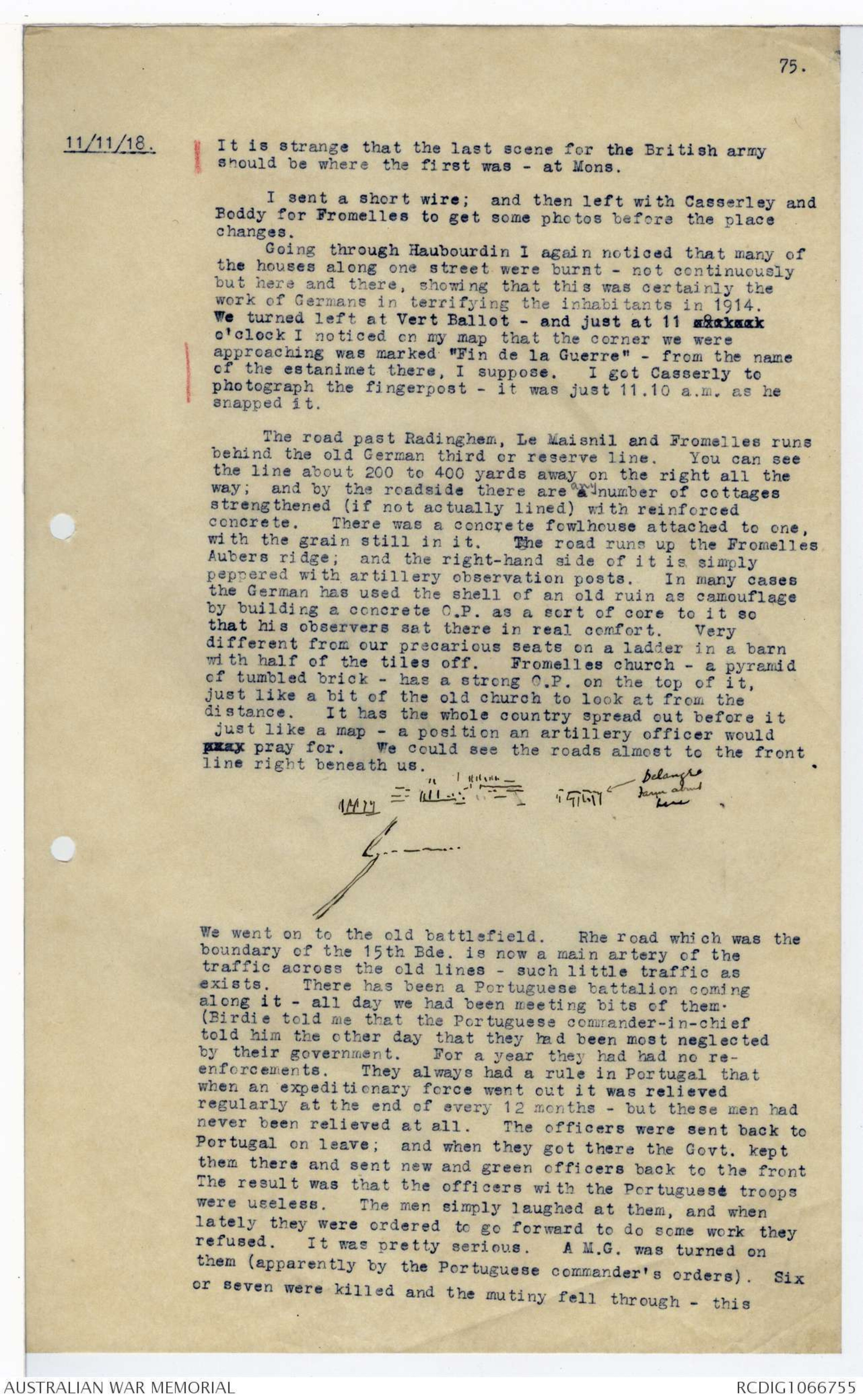
2.
66
4/11/18. The great discussion among the men is whether the move
is into a near area for moral support - or into the line.
They are disappointed but not taking it at all badly as far as
I can see. Some think it a shame that they are not getting
the full three months' rest, and all the officers say our
strengths are very low. They hope to be out again by
Christmas. I visited 6th and 7th Bns.
November 5. Tuesday. News today that we had taken 13,000 prisoners and 250
guns in the big attack which started yesterday. To-day is
a wet day - dull and drizzling. I visited 8th and then 5th
Bns. It is curious to see the difference. The 8th has a
young Colonel, Mitchell - a youngster with sporting tastes
who keeps a young sporting mess - a brave chap who always goes
round and sees for himself the moment it is possible to do so,
in battle; as young Howell-Price did - a very religious boy,
he was, with high and conscientious motives. The xxx 5th Bn
has a very courtly formal mess. Hastie is now their second
in command, but is going to Australia on leave, which will
make little Lillie second in command. Traill, of 8th Bn,
has command - a very brave but not a pushing man. Herod of xx 7th Bn - a N.S.W. youngster (as young as Mitchell) is a
different sort again; very quiet and shy (Mitchell is shy
of me, but in another way) - and with a quiet mess - living out
of his Bn rather than in it; and a great man for training.
His direction of the battle of Aug. 9 from the roof of a house
in the firing line was a fine bit of work, it seems to me.
I finished 2nd Bde.; and as they are leaving tomorrow
I came back late to Corps at Eu.
November 6. Wednesday. Came up with Cutlack to Lille to the Censor, leaving
Crawford to go with the lorry and our gear to 1st D.H.Q.
tomorrow - wherever that may be. We will meet them there.
The battles have been going well. The British are not
far from Avesnes - 13,000 prisoners and 350 guns captured;
and the Americans who attacked on Nov. 3 are within 12 miles
of Sedan; and the French got on 12 kilos. today.
Lytton tells us that in the battle of November 4 the N.Z.
division did extraordinarily well. They attacked Quesnoy
and got the outer defences. Theplace is an old French
fortified town with outer and inner defences. The Germans
in the inner ramparts held out. The N.Z. sent a bde. around
one side of the town and a Bn. round the other, and then
summoned it to surrender. The Boche refused. We then sent
aeroplanes over it dropping notes telling them to give in;
and a few Boches came in but their officers refused still.
A N.Z. officer, accompanied by two German officers and a
white flag, again summoned them to surrender, but they refused.
The N.Z. then attacked the place with scaling ladders and
scaled the walls (so Lytton says). They got it to surrender
at last and took 100 prisoners there. Around the town and
just south of it they got in all 4000 prisoners nd 80 guns -
one battery of Germans driving its own guns back as prisoners
into our line.
Tonight, as I was sitting with Philip Gibbs and Percival
Phillips, there came up a French officer, attached to the
British Press, who said that the Germans wireless at Nauen
(so French H.Q. announced) had sent out a message saying that
they were sending in a party to the allied lines to ask for
the terms of the armistice.
This looks as if it may be - may be - at last the end.
It is not three months since Aug. 8 - only 3½ since July 18 -
and it has changed so. The French officer thinks that the
German civil population is frightened - frightened of the
war coming into Germany and the bombing of Berlin. The
Czechs will probably get quickly into S. Germany unless
something is done.
3.
67
6/11/18. something is done.
The soldiers - the army- is not yet beaten so as to be
broken; it is still fighting, - as White said tonight when I
saw him. But the civilians behind it are giving, according
to all appearances.
The terms are said to be: The retirement of the German
Army out of Belgium, France, Alsace-Lorraine, and to a point
30 miles east of the Rhine - leaving its guns behind it; we
to bring troops up to the Rhine and to occupy bridgeheads.
The German submarines to come into two British south coast
ports from Atlantic and North Sea; and the German fleet to
anchor in the Bight of Heligoland under the guns of the
British fleet. (The Austrians have had to give up half their
artillery and half their fleet).
The reason why our move was delayed 24 hours was the
blowing up of a delayed German mine on the railway. This
has been happening everywhere and causing a lot of trouble -
it is one reason why the troops cannot get further than they
are, and quicker on the 4th Army front. They are 40 miles
ahead of the railways (Cadge says) owing to these mines, and
the railways are necessary in order to keep rations up to the
men. There is very little artillery fire now on the front
except on our side (so Cadge says).
November 7. Thursday. Left Lille today for the 9th Corps H.Q. It was most
interesting to come through the country where the earliest
battles in the wat were fought - outside of Lille on the Douai
road we noticed that a number of the houses had been destroyed
long ago - a percentage of them; and yet there were no obvious
shellholes around them or around that part of the country. It
must have been in the days when the guns were brought up to
fire direct on this house or that. It was like looking on the
sacred relics of some incident of the dim past.
The road to Lille had taken us through Lens, which was
completely broken up - utterly smashed so that it was hard to
know if the brickheaps and skeletons of twisted machinery were
in the town or in the suburbs. The only decently ordered
thing left was one plank road from the railway station to the
main road - apparently German.
To-day we struck Douai-Cambrai-Le Catelet. After Lille
I was surprised to see how much they were all knocked about.
Cambrai especially seemed to have had almost every house
affected by one shell or another. The hard fighting which the
Canadians had there must have done a lot of damage to the place.
We expected to find civilians here and at least a cafe where
we could get a cup of coffee to go with our lunch. But there
was none; and the Y.M.C.A. at the railway station was closed
until 2.30 p.m. Douai was just the same. The German has
done his damage to the railways exceedingly well. They tell
us that his mine which blew up the railway and which delayed
our 1st Div. move was at Epehy - which the Germans had left 7
weeks before - so long had his mine been delayed in its action.
In Cambrai the high tower of the church or Hotel de Ville
seemed to be intact; and so were the fine old towers of
Le Cateau - though the outskirts of the town were smashed. We
began to find the inhabitants again here - not so many as at
Lille and almost all old men and little children.
We called at Busigny, which was almost intact, to see 9th
Corps. Harper is the general - but we saw there Colonel Farmer,
formerly of 3rd Australian Division, who told us that our 1st
Division has been delayed another 24 hours and was going to
St Souplet. We passed Rawlinson's H.Q. (looking very snug in
a fine camouflaged train) and went on in the dark to St Souplet,
where the young town major was very decent. We found little
Norrie of the 11th Bn there arranging advanced billets with
4.
68
7/11/18. Priestly (Int. Officer 1st Aust. Divn. - now G.S.O. 3).
Norrie gave us one little house he had. Our lorry had not
arrived, so while Cutlack went off to 9th Corps to get some
rations I stayed at the billet and swept and cleaned it.
It had been an officer's billet in the German days; and
British officers and Americans had lived there since.
While I was there Priestly looked in. He had been up
the line. The British were very well, he said. The 32nd
Division apparently was on a one battalion front - one battn.
in line, one in support, one in reserve; one bde. in support
and one resting. The 32nd Divn. were going to sideslip onto
the 46th Divn next them; and our 1st Divn was going in north
of the 32nd.
Priestly said that the German white flag came in quite
close to here to-day. At about 10 a.m. a car came down the
road to Guise with great sheet flying from the top of it.
It contained two generals and two admirals. (Later :- it was
at 10 p.m. - a German labour company was sent out ahead to
fill in craters in the roads. The party consisted of 10 -
several generals; an admiral; Herr Erzberger; and a naval
captain.)
Cutlack this morning told me that the Germans knew the
armistice terms. Wilson had let them know of them. He had
informed them that the allied council at Versailles had
agreed to his 14 points being taken as the basis for
negotiation except as to two points: first, the freedom of
the seas must be understood in the sense given to it by the
Allies (which means Great Britain's interests must be safe-guarded).
Secondly, the restoration must include the
restoration of civilians of France and Belgium in their
occupations. On hearing this the German Govt. xeems to have
decided to send party at once to ask the terms of the
armistice. This looks as if peace were certain.
White and Wynter both spoke to me of Hughes and his
attitude. He is going to make any decent arrangement
extraordinary difficult. For example - no sooner has
Hughes (partly as the result of my telegram) been allowed
to stay over here and help to administer and support
demobilisation, than he rings up Dodds to know if the
"cards" ar ready. The cards are the documents issued to
every man to fill in with his occupation, and all the details
covering himself, so that the authorities may know in what
category to send him home. The A.I.F. military authorities
here have now leave to issue these. Dodds had them printed
in accordance with instructions from Defence. Hughes said -
"Have you asked them if they are members of a Trades Union?"
Dodds said -"No; Defence has instructed us not to ask that
question". Hughes said he would wire the Cabinet - and the
cards are held up accordingly.
Then Hughes came down on the Education Scheme, which the
men are so pathetically keen about, with all the contempt
in his little nature: "Your education scheme is worthless"
he said. "What you can do in six or seven months is
rubbish - you are like a camel trying to break through the
Pyramids by piddling against them!"
Murdoch got me to add to my telegram from Paris that
strong political support was needed to the military scheme
for demobilisation, and of course this pointed straight at
Hughes. But if Hughes is going to act like this he is
justifying the idea one used to have of him as a completely
selfish politician; and it cannot be tolerated that he
should wreck our demobilisation at this stage. It is still
entirely undecided whether Birdwood or Monash shall carry it
out.
5.
69
7/11/18.
Hughes wants Birdie to go over and see him. Birdie thinks
Hughes wants to give him his conge verbally because he fears
to put it in writing, and he will not go. Possibly this is
true. In the meantime the interests of the A.I.F. go uncared
for. White got Birdwood, against Birdwood's will at the time,
to approach Defence on this subject in 1916 (Birdie is rather
proud of it now). And practically nothing is done yet.
White tells me that if he had his way, when the war ended he
would abolish the Corps staff and bring the whole of the
divisions under G.O.C., A.I.F. Then use the Corps staff
largely as the demobilisation staff. Men are to be sent back
by their trades - not by units. White would have them
organised at once into proper companies with the right number
of officers and N.C.O.'s according to their trades. But
White does not know if Birdwood will be asked by Hughes to do
the job, and I don't think he will. I told White that Hughes
didn't think Birdwood capable of this organisation. "Well,
then, the thing is for him to say so, straight - choose Monash
to do this and invite Birdie to visit Australia" said White.
Wynter says that he is convinced that White is the most
capable organiser we have - a better administrator than Monash.
November 8. Friday. Cutlack and I and old Boddy slept last night in this
house, which I had swept last evening. This morning we found
some old military packing cases and a chopper (I found the
pump last night and good water as far as its looks go). We
chopped the packing cases, made a fire, boiled some tea and
broiled some bacon.
In the morning Cutlack went round to 4th Army in their
train near here and learnt that the German fleet had mutinied.
We have caught a wireless message from Engineer's mate BEHRER,
at Berlin, to the "3rd Battle Squadron", telling them that a
party had gone to Paris to arrange the terms of the armistice,
and urging them to remain loyal on this account. It seems
that the crews of all the submarines in the nearer seas
(which had come into harbour together) had mutinied; and the
others were determined not to go out to sea for the fight
which they thought their officers were planning for.
This is better than anything we could have hoped for - a
gleam of independence in the German People. Philip Gibbs
told me at Lille that he met at Bruges some of the girls who
kept a restaurant there. Bruges was a regular headquarters
of the German submarine warfare, and the crews and officers
used to come in there for a few days and go off again. The
officers were the most terrible "thugs" - a rough crowd
engaged on absolutely desperate business - it was regarded as
the deadliest service in the war, more dangerous than air work.
The girls kept a tally of each of these officers who used
regularly visit their tearoom. When they went out they put
a mark against their names; and if they did not come back
within a certain time they knew they were dead. The list
of submarines losy was a tremendously long one, they said.
(This is very unreliable, but it does show what sort of man the
submarine officer was and what the work was like - and it
explains something of the reason for the mutiny).
Our lorry arrived during the morning with Crawford in
charge, and Scott and Bennett and Dorrington (Wilkins's
half - Irishman, half-American, half-mutinous cook), and plenty of
rations. Glasgow arrived this afternoon ahead of his H.Q.;
and so we had him, and Ross his Chief of Staff, and Arthur
Maxwell his A.D.C.m in to dinner. And what with Yank's
cooking, and a first-rate supply of crockery found in this
little house, and a box of cigars sent me by W. S. Robinson
after his visit, and a cake (a beautiful Australian cake)
made and sent for Christmas by the little mother, we had a
first-rate dinner.
6.
70
8/11/18. Glasgow is a splendid straight chap. He wants the
newspapers to give us a clean lead after the xxx war, and the
youth of the country to be moulded by schoolmasters of
character (rather than of learning) - because (as I too am
firmly convinced) you can do anything with the young
Australian if you give him the right lead - he is capable ofxxxxxxxxxxxxxxxx the utmost brilliance and devotion. The
need is to get their devotion turned from their selfish ends
to the good of their nation, and it is the easiest thing in the
world, given decent leaders.
They say that the Germans party arrived at Foch's place
to-day. The party immediately put down a list of terms which
it said it was prepared to accept. Foch shook his head and
t old them that it was his terms that they had to receive; that
they could accept or refuse them, but only his terms
would be considered. The German party said that it could not
possibly conclude such an armistice without authority. Foch
said that they could send one of their party back with the
terms, and they would be allowed 72 hours to accept them or
leave them. The German party decided to send back the terms
by the captain who was with them.
To-day, like yesterday, has been a vile day - raining
most of the time. The line went forward 5000 yds. at least,
they say; and we expect the outposts to be past Avesnes
early tomorrow.
November 9. A beautiful day - cold, sunny. I took the chance of
driving (with Cutlack) to Dernancourt in order to get 20
photos of the battlefield before it is completely altered. I
must do the same at Fromelles (of which we have not a single
picture). Then I have to go to England to arrange for the
continuance (if possible) of Gullett's and Cutlack's positions;
my passage to Australia to establish the museum, etc,; the
printing of the little book on Reconstruction, which White
says they will make"the bible" of the education scheme; and
other things.
I noticed that in all the country we went through we did
not begin to see signs of really heavy artillery fighting till
we got nearly to Beaurevoir. I should say that the artillery
put down a good barrage for the Americans when they attacked
towards Premont - but that that was the last stiff fight up
to this point. The Hindenburg battleground was of course
pitted with new shellfire of Sept. 29 and the first few days
of October - far heavier than anything since; that was quite
obvious.
On the other hand there was certainly heavy fighting at
Cambrai - it was heavily knocked about by recent fighting,
especially on the outskirts. The centre was, in one part,
blown up by the Germans exactly as Bapaume and Peronne was in
1917.
Le Cateau has also some signs of heavy fighting, though
nothing like Cambrai or the Hindenburg line - (Nauroy, Gouy,
Beaurevoir, Bellicourt, Bellenglise). Possibly it is partly
the result of the original battle in 1914. I have not seen
it in full daylight.
On our way to Dernancourt we called at 4th Army and
Herbertson told us that this morning our troops could not find
the German. He had gone in the night - cleared right away.
The nearest place our aeroplanes had found him in was Sivret
(or some such name). They thought he was off to the Meuse.
He delayed us in every way possible by his delay-action mines -
just a 5.9 shell with a clever fuse almost impossible to tell
from other fuses, which delays its action for weeks or days,
as required, by the amount of acid put in. (We have an
unused one in our War Museum - from Mericourt).
7.
71
9/11/18. He buries this under the lines of railway; sometimes he v
blows a crater in the line and then buries the shell at the
bottom of the crater. Our work party fills the crater in,
and a day or two later the shell blows it up again.
On coming back this evening we heard that the aeroplanes
which went over to-day found that they could not drop their
bombs on the Germans because when they went over the French
towns there were the French inhabitant s out in the street
waving the French tri-colour flag, and the Germans soldiers
mixing in amongst them.
General xxxxx Debeney, of the 1st French Army (so Arthur
Maxwell told us) considers that the German soldiers are out of
hand and have broken away from their officers, just as the
fleet has done. They are resisting well in parts, it is
said; but in other parts have clean gone.
This is all rumour. Glasgow hears that our 4th Division
has had its move countermanded. The 1st Division is to go
into the line about November 14 or 15. The 4th Army is not
advancing its line much beyond Avesnes for the moment. It
has instructed its divisions to hold a line through Avesnes
with their main body; and will follow the Germans with mobile
columns. We met the Scots Greysm with their grey horses,
on the road near Vermand to-day, moving up.
Lots of these details of fighting, etc. , are inaccurate.
They only represent the current talk at Army Headquarters or
Divisional Headquarters on the actual day when the things are
happening - vague rumours of the armistice conference which
have no doubt come to Rawlinson on the telephone from Haig or
Lawrence - several times repeated to Corps and Divisional
Generals, and through them to their staffs.
November 10. Sunday. Another glorious day. Coal is our difficulty
here. We are going to see if we cannot get some from old
railway dumps.
I suppose there is no armistice yet, for our planes are
flying over. Anyway, the 72 hours isnot over till tomorrow.
72.
November 10. Sunday. Today breaking beautifully clear and sunny, and the
German still having one day to mke up his mind whether
to accept the armistice terms of Foch, I decided to go up
to the forward area and see what was to be seen up there.
Boddy needed petrol and I went round to the youngster,
Norrie, who is Camp Commandant 1st Australian Division,
in a cottage by the village pond near General Glasgow's,
in order to find where we could get it.
There I found Priestly, G.S.O. 3, 1st Division,
lying on his bed not very well. "You've heard the news"
he said. "The Kaiser has abdicated - and his son also.
There has been a revolution in Munich, which has proclaimed
a Republic (Bavaria I believe is to be the State) xxxTheGerxxxx - and another revolution at Berlin in which the
army has joined. The German fleet has mutinied right
enough - Lloyd George has announced it - it was ordered to
put to sea, and it refused."
The news is wonderful - exactly what we have been fighting
for all these years and thought past hoping for.
Cutlack at once decided to come to Lille to the censor;
and as the Official Photographer's Warrant Officer, Casserley
had arrived just then, I abandoned the visit to the front and
decided to get a series of photographs of Fromelles and then
go straight to England. In the end Cutlack stayed to watch
things at the front (Corps moved up to Le Cateau tomorrow),
and I took Casserley to Lille, wiring to White to ask if he
could have us billeted.
On calling in at Army, Herbertson told me that he heard
that G.H.Q. was disappointed with the revolution. They did
not feel sure that there would be a stable government left to
negotiate with. On reaching 5th Army H.Q. at Lille young
Birdwood said the same; when I said the news was splendid
he said - "Don't you think it goes a little too far - this
revolution I mean; isn't it a little dangerous for our
country - a little infectious ....Bolshevism - we didn't want
to see that in Germany."
And now one thinks of it, as Wynter says - this explains
Lord Milner's Speech. He said that we did not want to press
Germany beyond the point of possessing a stable government -
so he too was really afraid of revolution.
I said to White this evening that I did not think that a
little revolution would do England any harm. He said he
hated the talk of revolution - England was a nation which
possessed the power of changing things without a revolution.
I told him I doubted if there were really a change in the
spirit of a nation's organisation, ever, without tthe tearing
up of roots by a revolution- compromise left things where
they were%, altered the form and left the reality.
Birdwood was having the King of the Belgians to dine
tonight - he has just taken him to Tournai (which fell today -
they are around Mons!); and I dined with Wynter (D.A.G. A.I.F.)
in E Mess. We passed today near Inchy (just West of Mons)
a narrow little curving bit of trench, all grassed over, just
north of Le Cateau Road, west of the town. I could have
taken my hat off to that little old trench: it must have been
one of the left flank posts of the British Army in the retreat
from Mons. Those houses which I noticed in the second
village outside Lille on the Douai Road, destroyed without
shellholes, must be a village burnt by the Germans for a
punishment during their first advance four years ago. The
houses were burnt, not shelled, and all the isolated houses
burnt too.
Wynter told me (we have seen no papers for days) that
73.
10/11/18. Hughes had written to the "Times" strongly putting the point
that he stayed in England so as to be available for
consultation; but that he had not been consulted when
President Wilson's 14 points were accepted by the British
Government and other allies. There was nothing in them
about the colonies of Germany - and there was a clause as to
equality of trade which put out of the question (if it were
literally enforced) our policy of preferential tariffs to
England and to our fxxxx friends. Unless Austria were forced
to do so she would certainly not treat German goods the same
as the British, French or American goods after the war.
The terms of peace were practically decided in the terms of
the armistice, he said. Why was he not consulted?
The "Times" made a very lame answer. Decisions of
immense importance have had to be made so swiftly, it said,
that it was impracticable to consult the Dominion representatives.
Hughes also pointed out that the 14 points made no
mention of indemnities; yet the Kaiser had promised his
people in the spring that they would get indemnities from the
allies.
In the first view I must say I think that Hughes was
absolutely in the right. There can be no good explanation
for not consulting the Dominions in the matter of the terms of
peace, and of the armistice.
There are rumours tonight that the German wireless
announces that the terms of the armistice have been accepted.
The civilians are convinced that the war is over. For the
soldiers of this 5th Army it is not a bad war. Even the
outposts are now sleeping in beds - so John Churchill says
(for what that may be worth). But the Germans are throwing
gas shells into the villages - there are no troops there, only
defenceless villagers who get down into the cellars and of
course are gassed badly - and some die. Old "Gas" Wilson
told me this. So it is true.
November 11. Monday. I was billetted with an old French lady who had lost her
house - a beautiful house - at La Bassee and another house at
Inchy, 5 miles out of La Bassee. German artillery had used
the Inchy house as a headquarters, the lady and husband
were living there with them. Two big guns were put in behind
the house and these drew the shells. First one end of the
house went, and then the other. A number of the German
signallers were killed; and some horses. The old people
(chicken rearers) lived in the cellar on and off; and then
they decided to go. They hid their jewels and plate by
burying them, and left the place. They went to a place called
by some name like Marquilly - 5 kilometres away or more. From
there the old man wanted to return and get some more valuables;
but they would not let him.
They heard that their La Bassee house and the Inchy house
were ruined. And presently they heard that the Germans in the
Inchy house had dug up their jewels. They knew that the
Germans had probes with which they sounded every inch of ground
however deep you dug; and the Germans had found their cache.
They laid a complaint before the Commandant; and the
Commandant had up the cooks of the 248th Regt. and examined
them; and a spoon and a fork or two were returned. But no
jewels - no valuable papers. Only - 6 or 9 months afterwards
there turned up from Germany and reached these old people in
due course a packet of jewels which had been amongst those
taken from their cache. The process had gone on along the
cumbrous distant channels of the State in Germany and had
resulted in these things being found and returned to them.
The old man and his wife decided to come from Marquilly
to Lille to some relatives. So he made a second cache of his
74.
11/11/18. precious things. This time he hid them in an outhouse;
over them he put tarred felt or some sort of non-conductor;
over that he put pile of wood - very deep. He hid there,
amongst other things, a crucifix; and a diary - now run
into four volumes - which he had kept every day of the war -
a very frank one. He hid this in a German kettle and buried
it at the bottom of this cache.
Nine months later they heard that this cache, too, had
been dug up. The old man would not believe it. "Pas
possible" he said. Presently they heard definitely that
one of the women in the place had the little bronze crucifix
in her possession. This made it certain that the cache had
again been discovered. The old xxx man was very nervous
about his diary and what had been written in it. It
certainly would have got him into trouble. However he made
up his mind to go to the Commandant at Marquilly. He did
so. He could not be frank but he made some sort of case.
The Commandant sent for his men, and they said - "Your
treasure - yes - it was a pig which dug up your treasure.
We flung the books away because they smelt so bad".
And that was what had happened. The German cooks had
used the wood; then they put a pig into the outhouse. The
pig, nosing about, had rooted up the cache. Probably the
books too had been rooted up; and being in the pigstye, they
smelt so strongly that the men had thrown them away.
The old man had died just three months ago. The old
lady, a few weeks since, hearing that the district was free,
had walked there. She could not get a permit to go, but she
went - on foot. She knew the house had been smashed. But
she found it a mere heap of bricks; the trees bare shredded
stumps; huge craters in the garden. Yet she spoke of it
quite cheerfully. Wonderful, wonderful people, these
French. Fancy her walking to that place from Lille - it
must have taken days.
This morning she insisted on giving me coffee in the
kitchen. When I went upstairs to dress I heard a few hoarse
cheers in the street. It was a company of a labour battn.
marching through the Place Cormontaigne on its way to work,
the old fellows giving a gruff xxxxx cheer spasmodically and
waving at the upper windows as they went. A few o f the
Lille people strung out on either side of their road through
the square. There was an occasional bleating of some
child's tin trumpet.
I guessed what it meant. The armistice must have been
signed. The Mess had the rumour; and when I went round to
see General Birdwood afterwards, he and White had gone
suddenly to G.H.Q.; but MacGregor and Churchill told me that
the armistice had been signed.
The war ended at 11 0'clock this morning.
One could not realise it. No more gun flashes; no
more flares. Tonight the streets would be bright - the towns
would be lit; the cars would take the blackpainted eyelids
off their headlights. The munition factories would have to
bring their work gradually to an end; the business of the
world for the lastfour years was finished. We had won -
beyond all hope, everything exactly as the most optimistic
democrat would have planned it. The Kaiser and his son had
gone to live in Holland ....... I couldn't realise it and I am
sure the people of Lille couldn't. xx
We saw no demonstration whatever there. I went to Press
H.Q. The correspondents may stay on to follow up the
occupation of Germany by an allied army. Today they have all
gone off early to see Mons, which was holding out stubbornly
enough yesterday but which must be ours today. They do not
know (Lytton did not know when I saw him) that the War is over.
75.
11/11/18. It is strange that the last scene for the British army
should be where the first was - at Mons.
I sent a short wire; and then left with Casserley and
Boddy for Fromelles to get some photos before the place
changes.
Going through Haubourdin I again noticed that many of
the houses along one street were burnt - not continuously
but here and there, showing that this was certainly the
work of Germans in terrifying the inhabitants in 1914.
We turned left at Vert Ballot - and just at 11 xxxxxx
o'clock I noticed on my map that the corner we were
approaching was marked "Fin de la Guerre" - from the name
of the estanimet there, I suppose. I got Casserley to
photograph the fingerpost - it was just 11.10 a.m. as he
snapped it.
The road past Radinghem, Le Maisnil and Fromelles runs
behind the old German third or reserve line. You can see
the line about 200 to 400 yards away on the right all the
way; and by the roadside there are a any number of cottages
strengthened (if not actually lined) with reinforced
concrete. There was a concrete fowlhouse attached to one,
with the grain still in it. The road runs up the Fromelles
Aubers ridge; and the right-hand side of it is simply
peppered with artillery observation posts. In many cases
the German has used the shell of an old ruin as camouflage
by building a concrete O.P. as as sort of core to it so
that his observers sat there in real comfort. Very
different from our precarious seats on a ladder in a barn
with half of the tiles off. Fromelles church - a pyramid
of tumbled brick - has a strong O.P. on the top of it,
just like a bit of the old church to look at from the
distance. It has the whole country spread out before it
just like a map - a position an artillery officer would xxxx pray for. We could see the roads almost to the front
line right be beneath us.
Diagram – see original document
We went on to the old battlefield. Rhe road which was the
boundary of the 15th Bde. is now a main artery of the
traffic across the old lines - such little traffic as
exists. There has been a Portuguese battalion coming
along it - all day we had been meeting bits of them
(Birdie told me that the Portuguese commander-in-chief
told him the other day that they had been most neglected
by their government. For a year that had had no re-enforcements
They always had a rule in Portugal that
when an expeditionary force went out it was relieved
regularly at the end of every 12 months - but these men had
never been relieved at all. The officers were sent back to
Portugal on leave; and when they got there the Govt. kept
them there and sent new and green officers back to the front
The result was that the officers with the Portuguese troops
were useless. The men simply laughed at them, and when
lately they were ordered to go forward to do some work they
refused. It was pretty serious. A M.G. was turned on
them (apparently by the Portuguese commander's orders). Six
or seven were killed and the mutiny fell through - this
 Deb Parkinson
Deb ParkinsonThis transcription item is now locked to you for editing. To release the lock either Save your changes or Cancel.
This lock will be automatically released after 60 minutes of inactivity.